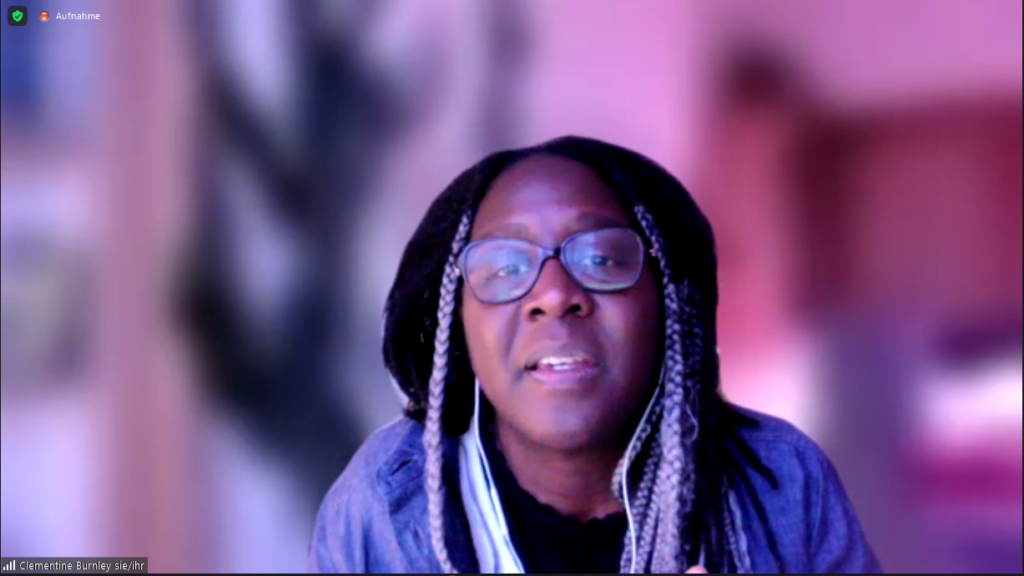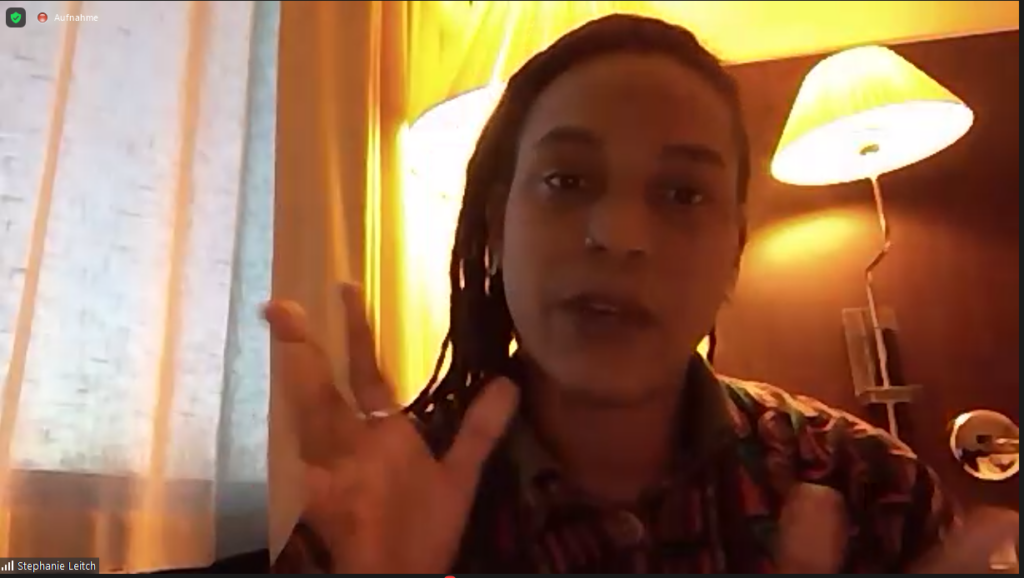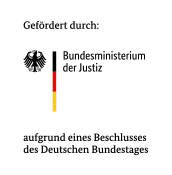Webtalk with Stephanie Leitch, ILGA World, Trindad & Tobago
Most people agree in principle. It’s better not to do harm. What they lack are the details of where, for what reasons and most of all, how can people from large and small NGOs, implementing organizations, the community, migrant organizations and faith-based international organizations with and without project experience, work equitably, sustainably and effectively with highly marginalized and sometimes criminalized LGBTIA people, and the organizations which these people run?
After a brief input by Stephanie Leitch, on what ILGA World – the International Lesbian, Gay, Bisexual, Trans and Intersex Association, does, we unfolded the topic of inclusion in development projects. Stephanie spoke to me, Clementine, in the context of successful efforts by civil society organisations and networks in Germany to help shape the “LGBTIQ* Inclusion Plan for Foreign Policy and Development Cooperation” of the German Foreign Office and the Federal Ministry for Economic Cooperation and Development (BMZ). The article is a mixture of transcribed remarks, comments and questions raised by participants.
A decolonial feminist approach to foreign policy in a context of actual, asymmetrical global power relations which originate in colonialism, is quite ambitious. I asked Stephanie Leitch to speak to some very large questions, knowing we would just be able to scratch the surface in the time we had together.
Stephanie Leitch drew from knowledge built in projects for and with LGBTI people in the contexts of her self-founded NGO organization and of her work with ILGA World through the eyes of people with lived experiences of facing harm because they’re lesbian, gay, bisexual, trans and inter. I was interested in how that lived experience of operating in a specific local context can provide insights useful to build the “Do no harm” practices of international cooperation partners.
Over the forty minutes we spent together Stephanie touched upon what “do no harm“ principle might look like in practice, gave a personal example of harmful power relations, and spoke of how LGBT*I*Q exceptionalism might hamper a meaningful engagement with marginalised, criminalised people and groups.
I came away with some valuable insights. But first a quick overview of the how the BMZ came to its position on inclusion. Since 2012 civil society actors such as the Yogyakarta Alliance have pointed out that German colonial and missionary history is relevant for an inclusive approach to German development cooperation and foreign policy planning. One of the programs the Yogyakarta Alliance “Cultures and colonialism” would like to see implemented, would promote organizations, persons and groups that compile and document histories, life stories and traditions of regional “homosexualities, sexualities and histories of genders” in research partnerships with impacted countries.
Post-colonialism itself can be a disputed concept. People immediately ask if colonialism has gone away yet? Despite the slipperiness in defining exactly what falls under the umbrella term, a “post-colonial” development practice, asserts, firstly, that “homosexualities, sexualities and histories of genders,” predate contact with Europeans. Secondly countries and territories impacted by colonialism through the actions of German agents, German traders, soldiers and missionaries, continue to be negatively affected today. Those impacts were caused by the earlier process of enslavement of non-Christian indigenous peoples, through unequal power relations in the process of converting indigenous people to Christianity and then later, through Germany’s economic and social domination of German colonies. German organisations who lack knowledge about the history of colonialism can miss essential facts which are not strongly present in the development discourse in Germany.
By including the colonial history, the organizations and groups involved take into consideration how that past influenced the current attitudes towards LGBT*I* people. Of course, it’s necessary to do that reflection in a clear-eyed way, without painting a rosy picture of a mythic past in which everything was perfect.
Shift to a culture of listening to local partners
Stephanie opened up several avenues of enquiry. To state the obvious but frequently overlooked: Funders and partners can only learn by shifting to a culture of listening to local partners who are knowledgeable about persecution, stigmatization or discrimination of LGBTIA people.
Without the knowledge of how in-context risks arise, it’s difficult for both funders and implementing partners to mitigate those risks.
A risk of engaging in ungrounded, uninformed practice is to repeat the harms of the past, which have left much of the global south countries still subject to heavy economic and social exploitation at present.
A reflexive practice requires practitioners to hold awareness of who is being seen as a holder of knowledge and who is being seen as a receiver of knowledge, which tends to go along with who brings money and resources. They can use this awareness to guide interactions during project planning and processes. Womantra (Stephanies’ self-founded organisation) thinks the feminist and the LGBTIQ movements together, as categories which are often pitted against each other.
A reflexive process can help practitioners of “Do no harm” to engage with the roles, methods and past impacts of white supremacy, religion and patriarchy in the countries and sites where they are active so as to avoid simply continuing the same practices in the present.
Imposing a binary gender perspective on the indigenous cultures, a white charity approach which assumes all expertise comes from the global north, and the effects of morally conservative Christian missionaries views on the people sexual and gender identities of the people they engaged with, had consequences which are still felt today. The churches legitimation of the doctrine of discovery directly led to loss of land, culture and ability of the impacted people to live self-determined lives over long periods of time. These are sensitive topics which need to be handled in a way which focuses on the strengths and possibilities which already exist in the context and can be built upon.
It bears repeating at this juncture; a reflexive practice does not mean trying to roll back changes which have taken place, and it does not mean that there is no role for institutional actors in now-independent states.
One key issue is how to build in the capacity in German LGBT*I* organisations to recognise risks to highly marginalized and sometimes criminalized people when their context and experiences are not widely known or shared between project implementation contexts. It would be of interest to know which experiences are already known and how do these experiences transfer across contexts.
Insufficient awareness of how power dynamics shape the conversation
Another facet of risk to marginalised people Stephanie touched upon is insufficient awareness of how power dynamics shape the conversation or indeed impose silence on the partners who should guide the implementation of “Do no harm” policies and actions.
Examples of power abuse which Stephanie gave, include withdrawing funding, refusing people a voice, dehumanising global south human rights workers, and NGO leaders not sharing economic and other resources in a fair way
Stephanie also made the point that regardless of the intentions the rhetoric of “Do no harm,” needs to be matched by individual action. Otherwise it might not conform to on-the-ground experiences.
Stephanie gave a real example of an in-person interaction, when a white man who is senior in the hierarchy, directly intervened to tell a Black woman, who is an implementing partner, an expert in her own right and a colleague in the wider sense: “You should not speak.” This is an important illustration of hierarchical power being used against, rather for the “Do no harm principle.”
I found the example striking because it took place in a room full of white people working in the field, who should implement “Do no harm,” policies. No one felt able to intervene and support the voice of the Black woman. There’s little point espousing a policy which in reality people don’t feel empowered enough to embody within the institution which promotes it. Therefore, as Stephanie pointed out, it’s necessary to impose consequences for power abuse in interactions between global North and global South people, at interpersonal and organisation level.
“Do no harm” needs to be matched by individual action
In her final remarks Stephanie made the point that LGBTQIA exceptionalism forces marginalised people into competition with each other and is best avoided.
One issue I am still curious about, is whether there were projects which not only reflect on the colonial legacy but enact a departure from colonial continuities.
After thanking Stephanie for giving insights in her work, the listeners raised a few final questions.
- I wonder how you keep going – to work in this NGO context after making these experiences?
“Through a love of justice, and a love of people, although people are shit sometimes. I got burnout, some of the worst things happened to me were from inside the activist community, I left the activist scene for a position outside my region where I could be paid properly.”
- What do you think needs to be done within the LGBTQIA community and queer spaces to make them safer for Black people and people of colour and how can this solidarity be concretely set into action?
“Look at upper management, make sure the leadership is diverse. Our leadership still looks the same as it did 200 years ago. Bring people in who can understand lived experiences of BiPoC and make spaces safe”
In the words of Audre Lorde “Protect me, don’t make me throw away any part of myself” Stephanie said, in closing.
The Webtalk took place on 15 Dec.2022., at 4 PM CET
Stephanie Leitch, Senior Officer at ILGA World, was in conversation with Clementine Burnley, writer, facilitator and intersectional feminist trainer.
This event was part of the project: “Do no harm – How to minimize risks for LGBTI in international project work” from the Hirschfeld Eddy Foundation (HES). All project texts are in the Hirschfeld-Eddy blog under “DNH-2022″.






